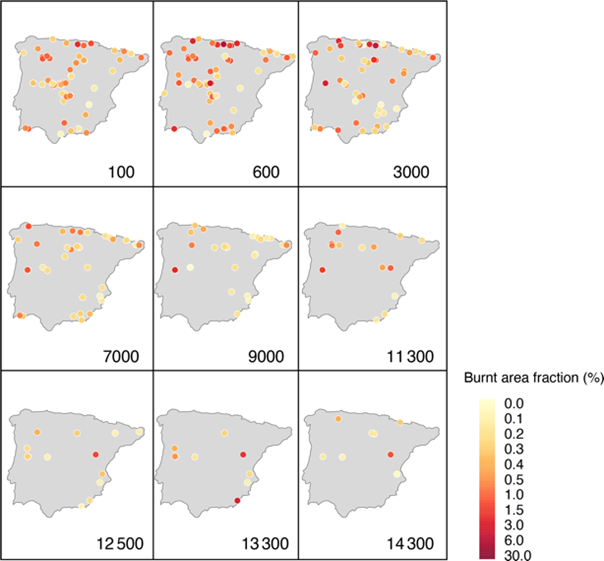Natalie Sanders writes: How do we disentangle extreme fire events resulting from climate change with natural wildfire regimes? And how might we model the interaction of climate and ecosystem properties,…Read More >
research article
A novel method for using pollen records to reconstruct historic fire regimes – By Natalie Sanders and Yicheng Shen
The Iberian Peninsula, home to Mediterranean beaches and mountains, pine trees and paella, sangria and siestas. But this southwestern region of Europe, mostly comprised of Portugal and Spain, is also…Read More >
Furthering our understanding of the global patterns of burnt area, fire size and fire intensity – By Olivia Haas and Natalie Sanders
Wildfires are a fundamental ecological process, but studying wildfire patterns and properties at a global scale is challenging. Understanding wildfire processes however, is essential to fully describe global vegetation distribution…Read More >
Leaf morphological traits as adaptions to multiple climate gradients
Leaf morphological traits as adaptions to multiple climate gradients By Natalie Sanders and Wang Han Using leaf morphological traits in ecosystem modelling is limited, primarily because the function of many…Read More >
Modelling the Growth and Yield of Arable Crops; an important addition to the assessment toolkit using Eco-Evolutionary Optimality concepts
Recently published paper in Environmental Research Letters https://iopscience.iop.org/article/10.1088/1748-9326/ac2e38 Shenchao Qiao Tsinghua University writes: “Global food security is an ongoing challenge owing to the continuous rise in the human population. Evaluation…Read More >
Coordination of plant hydraulic and photosynthetic traits: confronting optimality theory with field measurements.
Recently accepted paper for publication in New Phytologist https://doi.org/10.1111/nph.17656 Huiying Xu, Tsinghua University writes: “Close coupling between water loss and CO2 uptake processes lead to the long-observed coordination between hydraulic…Read More >
Tansley Review Paper published
Sandy Harrison, LEMONTREE PI, writes: The LEMONTREE (Land Ecosystem Models based On New Theory, obseRvations and ExperimEnts) project is currently developing a next-generation model of the terrestrial biosphere and its…Read More >



